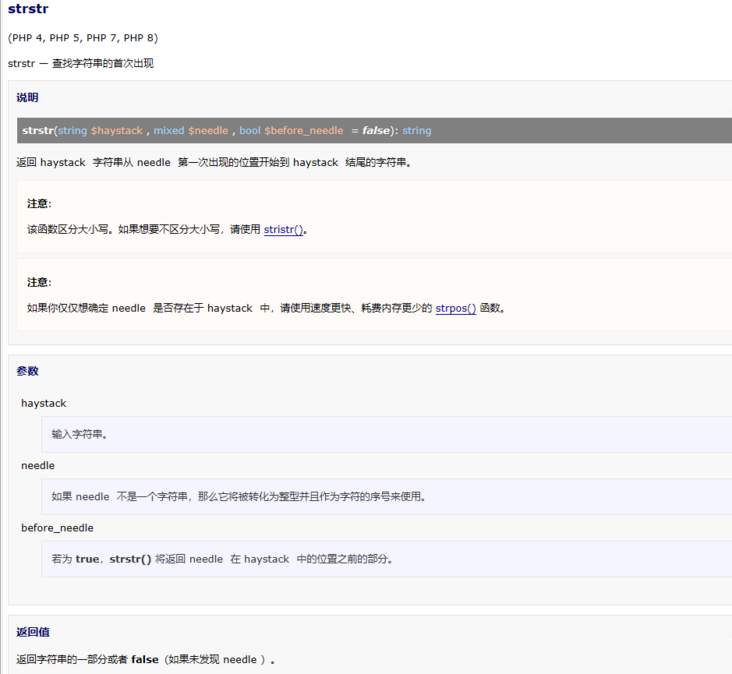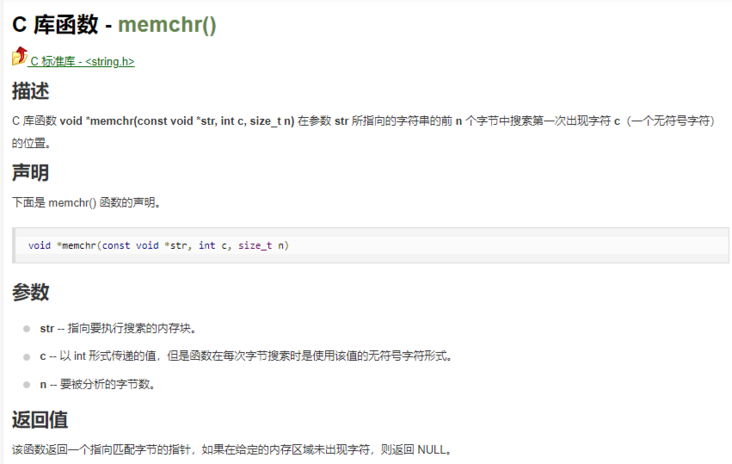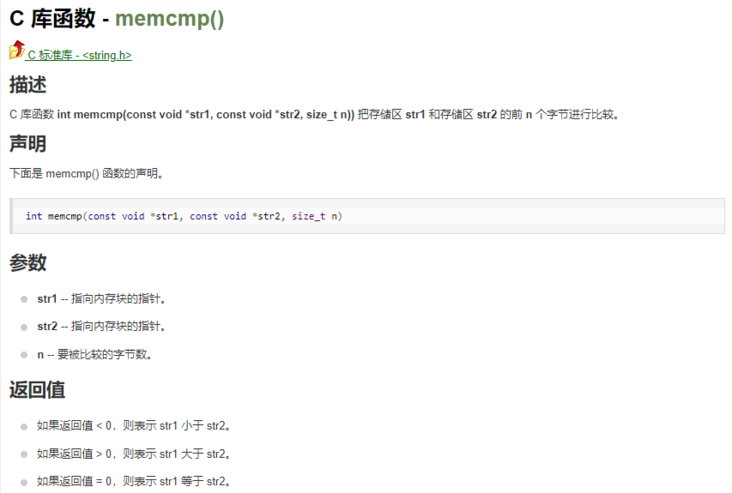PHP strstr 源码分析
zzMeow -strstr函数原型

PHP_FUNCTION(strstr);PHP_FUNCTION(strstr)
{
zval *needle;
char *haystack;
int haystack_len;
char *found = NULL;
char needle_char[2];
long found_offset;
zend_bool part = 0;
if (zend_parse_parameters(ZEND_NUM_ARGS() TSRMLS_CC, "sz|b", &haystack, &haystack_len, &needle, &part) == FAILURE) {
return;
}
if (Z_TYPE_P(needle) == IS_STRING) {
if (!Z_STRLEN_P(needle)) {
php_error_docref(NULL TSRMLS_CC, E_WARNING, "Empty delimiter");
RETURN_FALSE;
}
found = php_memnstr(haystack, Z_STRVAL_P(needle), Z_STRLEN_P(needle), haystack + haystack_len);
} else {
if (php_needle_char(needle, needle_char TSRMLS_CC) != SUCCESS) {
RETURN_FALSE;
}
needle_char[1] = 0;
found = php_memnstr(haystack, needle_char, 1, haystack + haystack_len);
}
if (found) {
found_offset = found - haystack;
if (part) {
RETURN_STRINGL(haystack, found_offset, 1);
} else {
RETURN_STRINGL(found, haystack_len - found_offset, 1);
}
}
RETURN_FALSE;
}文件位置 Zend/zend.h
typedef struct _zval_struct zval;
struct _zval_struct {
/* Variable information */
zvalue_value value; /* value */
zend_uint refcount__gc;
zend_uchar type; /* active type */
zend_uchar is_ref__gc;
};needle是一个变量结构体,对应php strstr 函数参数 mixed $needle
1、char *haystackchar *haystack s是一个字符指针,对应 php strstr函数参数 string $haystack
2、zend_parse_parameters文件位置 Zend/zend_API.c
int zend_parse_parameters(int num_args TSRMLS_DC, char *type_spec, ...);
int zend_parse_parameters_ex(int flags, int num_args TSRMLS_DC, char *type_spec, ...);
ZEND_API int zend_parse_parameters(int num_args TSRMLS_DC, char *type_spec, ...) /* {{{ */
{
va_list va;
int retval;
RETURN_IF_ZERO_ARGS(num_args, type_spec, 0);
va_start(va, type_spec);
retval = zend_parse_va_args(num_args, type_spec, &va, 0 TSRMLS_CC);
va_end(va);
return retval;
}
/* }}} */
ZEND_API int zend_parse_method_parameters(int num_args TSRMLS_DC, zval *this_ptr, char *type_spec, ...) /* {{{ */
{
va_list va;
int retval;
char *p = type_spec;
zval **object;
zend_class_entry *ce;
if (!this_ptr) {
RETURN_IF_ZERO_ARGS(num_args, p, 0);
va_start(va, type_spec);
retval = zend_parse_va_args(num_args, type_spec, &va, 0 TSRMLS_CC);
va_end(va);
} else {
p++;
RETURN_IF_ZERO_ARGS(num_args, p, 0);
va_start(va, type_spec);
object = va_arg(va, zval **);
ce = va_arg(va, zend_class_entry *);
*object = this_ptr;
if (ce && !instanceof_function(Z_OBJCE_P(this_ptr), ce TSRMLS_CC)) {
zend_error(E_CORE_ERROR, "%s::%s() must be derived from %s::%s",
ce->name, get_active_function_name(TSRMLS_C), Z_OBJCE_P(this_ptr)->name, get_active_function_name(TSRMLS_C));
}
retval = zend_parse_va_args(num_args, p, &va, 0 TSRMLS_CC);
va_end(va);
}
return retval;
}最简单的获取函数调用者传递过来的参数便是使用zend_parse_parameters()函数。
zend_parse_parameters() 函数的前几个参数我们直接用内核里宏来生成便可以了,形式为:ZEND_NUM_ARGS() TSRMLS_CC,注意两者之间有个空格,但是没有逗号。从名字可以看出,ZEND_NUM_ARGS()代表着参数的个数。
紧接着需要传递给zend_parse_parameters()函数的参数是一个用于格式化的字符串,就像printf的第一个参数一样。下面表示了最常用的几个符号。
type_spec是格式化字符串,其常见的含义如下:
参数 代表着的类型
b Boolean
l Integer 整型
d Floating point 浮点型
s String 字符串
r Resource 资源
a Array 数组
o Object instance 对象
O Object instance of a specified type 特定类型的对象
z Non-specific zval 任意类型~
Z zval**类型
f 表示函数、方法名称,PHP5.1里貌似木有... ...Z_TYPE_P
文件位置:Zend/zend_operators.h
#define Z_TYPE_P(zval_p) Z_TYPE(*zval_p)
#define Z_TYPE(zval) (zval).typeZ_STRLEN_P
文件位置:Zend/zend_operators.h
#define Z_STRLEN_P(zval_p) Z_STRLEN(*zval_p)
#define Z_STRLEN(zval) (zval).value.str.len文件位置:main/php.h
#define php_memnstr zend_memnstr
文件位置:Zend/zend_operators.h
static inline char *
zend_memnstr(char *haystack, char *needle, int needle_len, char *end)
{
char *p = haystack;
char ne = needle[needle_len-1];
if (needle_len == 1) {
return (char *)memchr(p, *needle, (end-p));
}
if (needle_len > end-haystack) {
return NULL;
}
end -= needle_len;
while (p <= end) {
if ((p = (char *)memchr(p, *needle, (end-p+1))) && ne == p[needle_len-1]) {
if (!memcmp(needle, p, needle_len-1)) {
return p;
}
}
if (p == NULL) {
return NULL;
}
p++;
}
return NULL;
}memchr memcmp

举例:
strstr('hello word!','world');zend_memnstr(char *haystack, char *needle, int needle_len, char *end)
char *haystack = "hello word!";
char *needle = "world";
int needle_len = strlen(needle);
char *end = haystack + strlen(haystack) 尾部指针
char *p = haystack 字符首元素地址
char ne = needle[needle_len-1] needle 尾部单个字符 d
end -= needle_len // 初始:4231185 减后:4231180
(p = (char *)memchr(p, *needle, (end-p+1))) && ne == p[needle_len-1]
p = (char *)memchr(p, *needle, (end-p+1) // char *p = "world!";
ne == p[needle_len-1] // p[needle_len-1] == d
if (!memcmp(needle, p, needle_len-1)) //world == world
return phttps://www.kancloud.cn/fage/...
https://www.runoob.com/cprogr...
http://t.zoukankan.com/string...
特别申明:本文内容来源网络,版权归原作者所有,如有侵权请立即与我们联系(cy198701067573@163.com),我们将及时处理。
php介绍
PHP即“超文本预处理器”,是一种通用开源脚本语言。PHP是在服务器端执行的脚本语言,与C语言类似,是常用的网站编程语言。PHP独特的语法混合了C、Java、Perl以及 PHP 自创的语法。利于学习,使用广泛,主要适用于Web开发领域。
上一篇: Yii 实现生成二维码
下一篇: Git操作不规范,战友提刀来相见!
Tags 标签
phpphp源码扩展阅读
隐藏apache版本信息
2018-09-30 10:56:15 []CentOS 6.5安装php5.6
2018-09-30 11:36:53 []PHP版ZIP压缩解压类库
2018-12-22 13:11:00 []CentOS7.2安装 PHP7.3.4 操作详细教程
2020-06-28 19:09:43 []PHP 设置脚本超时时间、PHP脚本内存限制设置
2020-06-28 19:09:43 []PHP 函数filesize获取文件大小错误,一直不变
2020-06-28 19:09:43 []Linux php: command not found
2020-02-05 01:30:13 []php 缓冲区 buffer 原理
2020-06-28 19:09:43 []PHP中三种设置脚本最大执行时间的方法
2020-06-28 19:17:34 []加个好友,技术交流

